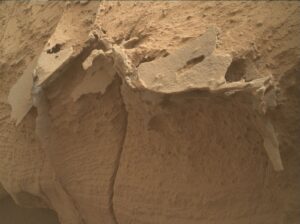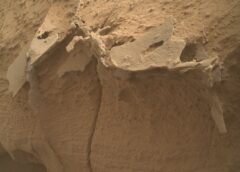Uranus, the seventh planet from the Sun, orbits in the outer solar system, about two billion miles (3.2 billion kilometers) from Earth. It is an enormous world – quadruple the diameter of Earth, with 15 times the mass and 63 times the volume. Unvisited by spacecraft for more than 35 years, Uranus inhabits one of the least explored regions of our solar system. Although scientists have learned some things about it from telescopic observations and theoretical work since the Voyager 2 flyby in 1986, the planet remains an enigma. It’s…
Read MoreLockheed Martin’s ‘Tantrum’ tech could help get satellites up and running without the wait
Lockheed Martin and Firefly Aerospace are combining to launch a demonstrator that aims to slash the time it takes spacecraft payloads to become operational. The unique wideband Electronically Steerable Antenna (ESA) developed by Lockheed Martin will test rapid calibration and could pave the way to payloads becoming operational much quicker. Calibration is the process of fine-tuning the sensor system to ensure it operates accurately and effectively once it is in orbit. While it can take months for traditional on-orbit sensors to be powered on, fully calibrated and readied to perform…
Read MoreHow to watch ‘Doctor Who’ anniversary specials: Stream ‘Wild Blue Yonder’ from anywhere
‘Doctor Who: Wild Blue Yonder’: Key information • Airs at 6:30pm (GMT), 1:30pm (ET) and 10:30am (PT) on Saturday, December 2• UK: Watch for FREE on BBC One and BBC iPlayer• Away from home: Use a VPN such as ExpressVPN to watch your usual service from anywhere• US, Canada and Australia: Disney Plus has the rights to stream “Doctor Who: Wild Blue Yonder” internationally The Doctor is back! To mark the 60th anniversary of the UK’s biggest sci-fi export, David Tennant returned to the TARDIS last weekend, alongside Catherine Tate as companion Donna…
Read MoreNASA’s Artemis 3 astronaut moon landing unlikely before 2027, GAO report finds
The Artemis 3 mission, which is now tentatively scheduled to fly in December 2025, may have to wait until at least 2027. NASA’s endeavor to return humans to the moon for the first time since the Apollo program with the Artemis 3 mission will likely be delayed because it is jeopardized by “multiple challenges” and an ambitious schedule, the U.S. Government Accountability Office announced Thursday (Nov. 30). Based on interviews with NASA and industry officials and reviewing documentation, the GAO reported it found a significant amount of pending technical work…
Read MoreNASA Welcomes Angola as Newest Artemis Accords Signatory
NASA During a ceremony in Washington Nov. 30, Angola became the 33rd country to sign the Artemis Accords. The Artemis Accords establish a practical set of principles to guide space exploration cooperation among nations, including those participating in NASA’s Artemis program. NASA, in coordination with the U.S. Department of State, established the Artemis Accords in 2020 together with seven other original signatories. Since then, the Accords signatories have held focused discussions on how best to implement the Artemis Accords principles. The Artemis Accords reinforce and implement key obligations in the…
Read MoreThis ‘forbidden’ exoplanet is way too massive for its star
Astronomers have discovered a massive extrasolar planet, or “exoplanet,” orbiting an ultracool dwarf star that is way too small to host such a world, challenging scientists’ models of how planets and planetary systems are born. The planet in question, designated LHS 3154 b, is 13 times as massive as Earth, meaning that it has a mass similar to the solar system ice giant Neptune, yet it closely orbits a tiny dwarf star, which is nine times less massive than the sun. This means the ratio between the Neptune-like world and…
Read MoreErickson to Retire after Over 40 Years of Service
3 min read Erickson to Retire after Over 40 Years of Service December 1, 2023 It is my pleasure to share information about new hires within NASA’s Science Mission Directorate (SMD) on this blog, and it is also my bittersweet duty to share information about retirements. After 40 years with NASA, Kristen Erickson – Director of NASA Science Engagement & Partnerships Division — will retire at the end of 2023. Kristen has made many contributions to the agency. Over the years she has mentored dozens of scientists and engineers to…
Read MoreNASA Honors Steve Jurczyk, Former Acting Administrator, Space Leader
Former NASA Acting Administrator Steve Jurczyk delivering remarks during NASA’s 60th anniversary. NASA/Joel Kowsky Former NASA Acting Administrator Steve Jurczyk passed away Nov. 23, at the age of 61, following a battle with pancreatic cancer. During his career, which spanned more than three decades with the agency, Jurczyk rose in ranks to associate administrator, the highest-ranking civil servant, a position he held from May 2018 until January 2021. He ultimately went on to serve as acting administrator between administration changes, serving in that position from January 2021 until his retirement…
Read MoreHubble Celebrates 30th Anniversary of Servicing Mission 1
6 min read Hubble Celebrates 30th Anniversary of Servicing Mission 1 Astronaut F. Story Musgrave works in the space shuttle Endeavour’s cargo bay while the solar array panels on the Hubble Space Telescope are deployed during the final Servicing Mission 1 spacewalk. NASA In the pre-dawn hours on Dec. 2, 1993, the space shuttle Endeavour launched from Kennedy Space Center in Florida on a critical mission to repair NASA’s Hubble Space Telescope. Hubble was designed to be serviced in space with components that astronauts can slide in and out of…
Read MoreNASA Research Pilot David Zahn
“Everyone needs an anchor from their community to motivate and inspire them to move forward. I want to be a motivational anchor for the next generation of minorities.” – David Zahn, NASA Research Pilot, Ames Research Center
Read More







